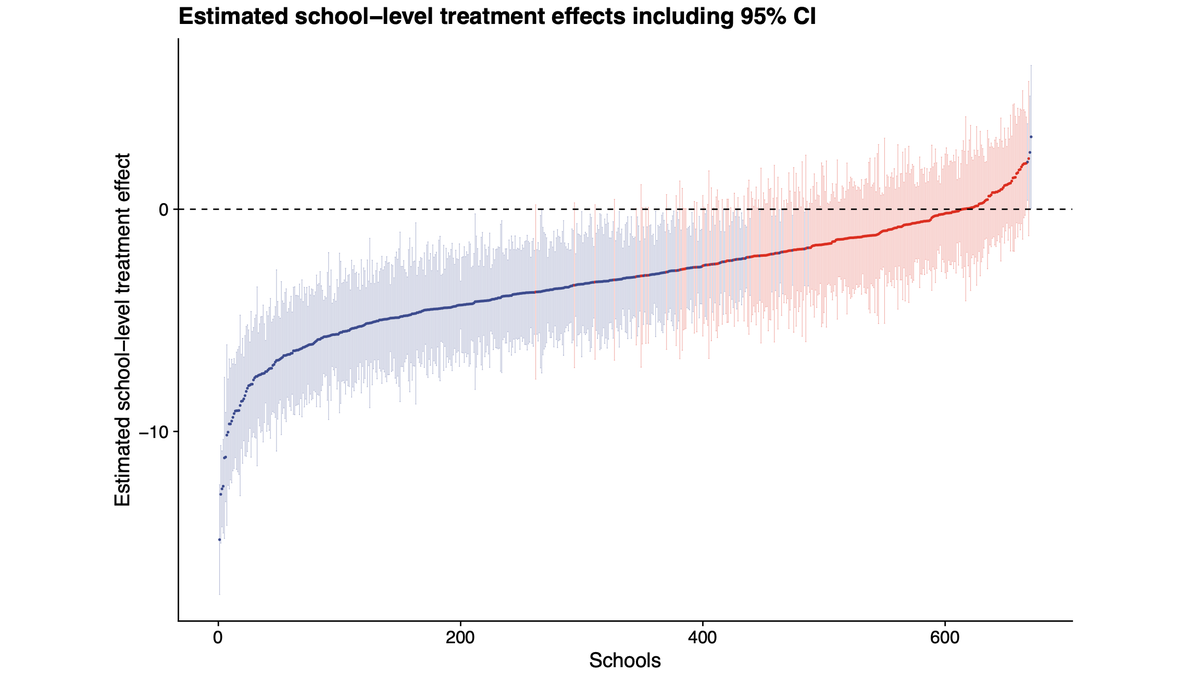What happened to learning when primary schools first closed to curb the pandemic a year ago? We answer this question in a paper with @ArunFrey @MarkDVerhagen that is now out in @PNASNews. Join me for a thread!  https://abs.twimg.com/emoji/v2/... draggable="false" alt="🧵" title="Thread" aria-label="Emoji: Thread"> 1/12 https://doi.org/10.1073/pnas.2022376118">https://doi.org/10.1073/p...
https://abs.twimg.com/emoji/v2/... draggable="false" alt="🧵" title="Thread" aria-label="Emoji: Thread"> 1/12 https://doi.org/10.1073/pnas.2022376118">https://doi.org/10.1073/p...
We study the Netherlands and use national tests that occurred before and after an 8-week lockdown. Three big findings: 1) students made little or no progress learning from home, 2) social inequalities increased, 3) wide variation across schools. 2/12
School closures saw students drop 3 percentiles. Using variation from normal years, we estimate that this corresponds to 8 weeks of lost learning, the same period that schools were closed. Hence, progress was limited during this time. 3/12
Among students from the lowest educated homes, losses are about 50% larger – implying they came back knowing less than before. In contrast, there are no differences by sex, prior ability, grade, or subject. 4/12
There is large variation across schools, dwarfing that by social background. The hardest hit schools saw losses 3-4 times larger than the average. Highlights the different challenges that now face schools returning from lockdown. 5/12
Are losses temporary or lasting? Only time will tell, but tests that do not contain curricular content were less affected. Thus, this seems to be about knowledge retention more than temporary stress or testing conditions. 6/12
How representative is the Netherlands? In reading performance, close to OECD average; in many other respects not. Three key diffs: world-leading broadband access, central and equitable school funding, short first lockdown. Consequences may be more dire elsewhere. 7/12
What needs to be done? The Dutch govt has set an example by devoting 8.5 billion euro to summer tutoring, increased school staff, mental health support, tuition fee cuts, and more. 8/12 https://translate.google.com/translate?sl=nl&tl=en&u=https://nos.nl/artikel/2369072-8-5-miljard-euro-om-corona-achterstanden-in-onderwijs-weg-te-werken.html">https://translate.google.com/translate...
Lots more details and nuance in the paper, I will just highlight a few more points. We do extensive robustness checks, including comparing siblings within the same family to make sure we compare “like with like” in 2020 and earlier years. 9/12
We also test more than 2,000 alternative models in a specification curve analysis. Results are similar, but learning losses in mathematics are particularly robust to model assumptions. 10/12
Too many people to name helped improve this paper. We especially thank editor @florenciatorche and 3 reviewers who gave invaluable feedback. And thanks to our academic home @OxfordDemSci @LeverhulmeTrust who let us go all in on this. 11/12
If you’ve read this far, we need your help. Answer this short survey to help predict where students stand in spring 2021, one year after initial closures. We will investigate this next and are curious about your best guess. THANKS 12/12 https://docs.google.com/forms/d/e/1FAIpQLSe2WHU0hkAXUtiqFtGHqwPbtS0eD9erKEmrV-zjUv6j20MHlg/viewform">https://docs.google.com/forms/d/e...

 Read on Twitter
Read on Twitter









